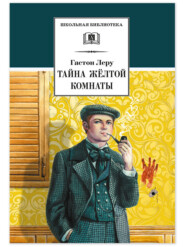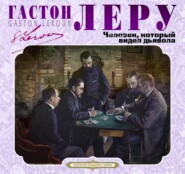По всем вопросам обращайтесь на: info@litportal.ru
(©) 2003-2024.
✖
The Double Life
Автор
Год написания книги
2018
Настройки чтения
Размер шрифта
Высота строк
Поля
Upon returning from their trip, Adolphe accompanied Théophraste up the stairway, and as it was late he announced his intention of leaving at once. He ordered his friend to go to bed so that he might get up early the next day to make further researches. He shook his hand with a show of sincerity, and as he went downstairs, looked up to Théophraste, who was holding the lamp for him, and murmured, “Good-bye, till to-morrow.”
Théophraste closed the door of the apartment with the greatest care, and as he made the second turn to the latch, he said to Marceline, “Now that we are very often in the country, we ought to have extra bolts for safety.”
Théophraste and Marceline searched the apartment before going to bed. They went into the kitchen, into the dining-room, into the parlor, and into the office. Nothing unusual had happened during their absence. Everything was in its usual place.
Having gone to bed, Théophraste lay awake for some time. He amused himself by thinking of Cartouche and all the wonderful things he had done. While he tried to fall asleep, his mind kept continually going back to the same theme. Suddenly he opened his frightened eyes in the darkness, and laid his hand on his wife’s arm, waking her. Then, in a voice so low that he alone knew he had spoken, he said, “Do you hear anything?” Marceline woke with a start, and they both strained their ears. They heard something in the apartment. It was a peculiar sound like the purring of a cat. It seemed as if it came from the office, and they listened intently for some minutes, too frightened to move.
Théophraste, as we have said before, was not a brave man, and he would have given a hundred thousand francs for it to have been daylight. Marceline whispered in his ear, “Go and see what is the matter. You must, Théophraste. Take the revolver from the table drawer.” Théophraste just had the strength to answer, “You know very well it is not loaded.”
They listened again, but the noise had stopped. Marceline hoped that they had been mistaken. Théophraste, quaking with fear, then got out of the bed, and taking the revolver, softly opened the door which led into the office.
The night was clear, and the moon shone across the large blue table-cloth which was spread on the table. Théophraste recoiled. He pushed the door to by pressing his back against it, as if he would hinder whatever he had seen from entering the room. “What is it?” demanded Marceline, raising herself from the pillows. Théophraste, with chattering teeth, answered, “It does not purr any more, but it has moved. It is on the tea-table.”
“What is on the tea-table?”
“The cat!”
“Are you sure it was in its right place last night?” asked Marceline.
“Perfectly sure. I put my scarf-pin on it when I was going to bed.”
“Oh, you only think that you did it,” said Marceline. “Shall I light the lamp?”
“No, no. We can escape in the darkness. If I open the door on the landing we can call the conciergerie.”
“You are not afraid, then?” asked Marceline, who, now that she heard it was the cat, was recovering her senses. “It was an illusion that we had. You must have changed his place last night.”
“After all it is very possible,” said Théophraste. He only wanted to get back to bed.
“Put it in its place,” insisted Marceline. Théophraste decided to do so. He went into the office, and with a hasty, trembling hand took the cat from the tea-table and put it on the desk, and soon found himself back in bed. By this time they had recovered their composure.
They even smiled in the darkness to think that they had been afraid. However, a quarter of an hour elapsed, and they were frightened to hear again the rattle of the ornament. “Oh, it is not possible,” cried Marceline; “we are the victims of hallucination. There is nothing to astonish us after what has happened at the Conciergerie.”
It was Marceline who got up this time. She pulled open the door of the office, and came back at once towards Théophraste, and said with a voice so weak that it seemed far away, “You did not, then, put the cat back on the desk?”
“But I did,” growled Théophraste.
“Well, but it is back on the tea-table.”
“My God!” said the man hiding his head under the coverings.
Marceline was convinced that, in the disordered condition of his mind, he had left the cat on the tea-table. She took it, holding her breath, and put it on the table. The cat rattled audibly again as she did it, but neither Marceline nor Théophraste saw anything in this. Marceline went back to bed again.
Another quarter of an hour passed, at the end of which they again heard the same noise. Then an incredible thing happened. Théophraste turned like a tiger and cried out, “What is it? It is only too true, something unusual is happening.”
CHAPTER XIV
Petito Loses His Ears
WE will now go downstairs to the flat below, into the apartment occupied by Signor and Signora Petito. Signora Petito is saying, “I do not understand M. Longuet’s conduct at the dinner at all. He spoke such vague, peculiar words.”
“Well,” answers Signor Petito, “he has this treasure which may be found in the environs of Paris, and he is thinking of it. It is certainly very interesting, and I would like to find it myself. According to the document, my opinion is that one ought to look either at the side of Montrouge, or at the side of Montmartre. I am inclined to think that it is Montmartre, on acount of the ‘Coq.’ There was a castle ‘Coq de Percherons’ there. You will find it if you look at this plan of old Paris.”
They looked at the plan, and after a short silence Signor Petito added, “It is still very vague. For myself, I think that one ought to attach importance to the words ‘Le Four.’”
“My dear, then it is more and more vague,” said his wife, “for there are many furnaces around Paris. There were plaster furnaces, and quicklime furnaces, and many others.”
“My idea,” said Signor Petito, “is that Le Four does not mean ‘the furnaces.’ I remember that there was a space after the word ‘Four,’ on the paper. Pass my dictionary.” Signora Petito, noiselessly, and with great care, brought him the lexicon. They looked over all the words beginning with the syllable ‘Four.’ On account of the article, le, they decided not to pay any attention to feminine words.
Just then the clock on the mantel-shelf struck midnight. Signora Petito got up, and said to the Signor, “Now is the time. We will find some useful information on the floor above. They cannot hear you in your stockinged feet. I will watch behind their door at the head of their stairway. You know there is no danger, they are still in the country.”
Two minutes later a form glided over the landing at M. Longuet’s door, put a key into the lock stealthily, and went into the vestibule. M. Longuet’s apartment was arranged exactly like Signor Petito’s, and so the latter easily found his way into the dining-room. He acted with perfect composure, believing the apartment to be uninhabited. He pushed the office door open. As it was evidently the lock of the desk that he wished to reach. Signor Petito took the ornament which inconvenienced him and placed it on the tea-table. Then he quitted the room noiselessly, and entered the dining-room, from there into the vestibule, for he seemed to hear a voice on the stairway. He was without doubt mistaken, for he listened intently for some time without hearing a sound. When he came back into the office, he found the cat again on the desk, and purring. His hair seemed to stand on end, for the horror which had seized upon him was not to be compared to the horror which had seized upon those in the next room.
Signor Petito remained immovable in the bluish moonlight. With a timid hand he seized the little black cat. The movement caused by this made the cat purr again. Now he understood that in the cat’s pasteboard body there was a little ball, balanced in such a manner that it ingeniously simulated the purring of a cat when it was moved.
How frightened he had been! He felt a fool. All was explained. Did he not remove the cat before returning to the vestibule? Instead of having placed the cat on the table, as he thought, he must have replaced it on the desk. That was a simple explanation, and he paid the strictest attention this time when he placed it on the table.
While he was doing this there was a fresh noise on the stairway. It was only Signora Petito, who had very incautiously sneezed.
Signor Petito went hurriedly and silently back into the vestibule, and when he was reassured, went back into the office again.
The black cat had been returned to the desk again!
He thought that he would die of fright. A miraculous intervention had arrested him on the verge of a great crime, and he uttered a hurried prayer in which he promised heaven never to do it again. However, another quarter of an hour passed, and he attributed these surprising events to his conscience, and returning, placed the cat back again on the table.
Just then the door of the room was violently opened, and Signor Petito fell into the arms of M. Longuet, who did not express the least astonishment.
M. Longuet threw Signor Petito on the floor in disgust, and picking up the ornament, opened the window, and threw it out into the street. During this time, Signor Petito, who had gotten up, could hardly compose his features, for Mme. Longuet, in her chemise, was threatening him with a revolver. He could only stammer, “I beg your pardon, I really thought that you were in the country.”
M. Longuet went up to him, and taking him by one of his ears, said, “Now, my dear Signor Petito, we must talk.”
Marceline lowered the barrel of her revolver, and felt pleased at seeing her husband show such courage.
“You see, my dear Signor Petito,” continued Théophraste, “that I am calm. A little while ago I was getting angry, but it was only at that little cat which was keeping me from going to sleep, and which I have thrown out of the window. Rut be assured, my dear Signor, I shall not throw you out of the window. You have not kept me from sleeping, you have even taken the precaution to put on slippers. Many thanks. But why, my dear Signor, do you make that ridiculous grimace? It is without doubt on account of your ear. I have some good news to tell you which will perhaps put you at ease about your ears. Your ears will make you suffer no more.”
Having finished his sarcastic talk, Théophraste begged his wife to pass him a cloth, and ordered Signor Petito to go into the kitchen. “Do not be surprised that I receive you in the kitchen. I prize my carpets very much, and you will probably bleed like a pig.”
M. Longuet drew towards him a white wooden table, which he placed in the middle of the kitchen. He asked Marceline to place an oil-cloth over the table, and get him a large bowl. He then asked for a carving set, which he said she would find in the dresser drawer, which stood in the dining-room. Marceline tried to ask for an explanation, but her husband looked at her so coldly and so strangely, that, shuddering, she could only obey. Signor Petito, in a cold perspiration, tried to reach the door of the kitchen, but M. Longuet stood between him and the means of exit, and commanded him to be seated.
“Signor Petito,” said he, in a tone of the most sarcastic politeness, “you have a face which displeases me. It is not your fault; but then it is not mine, either. Certainly you are by far the most cowardly and the most despicable of thieves. But what does that matter? But do not smile, Signor Petito.” It is certain that Signor Petito had no intention of smiling.
“You have ridiculously large ears, and surely with such ears, you dare not pass by the corner of the Guiliere.”
Signor Petito clasped his hands and stammered, “But my wife awaits me.”
“What are you doing, Marceline?” Théophraste cried impatiently. “Do not you see that Signor Petito is in a hurry? His wife is waiting for him. Have you the carving set?”
“I could not find the fork,” answered Marceline in a trembling voice. (The truth was, Marceline did not know what to say, for she believed that her husband had become completely insane, and between Signor Petito the house-breaker, and Théophraste mad, she was in anything but an enviable position.) She had hidden herself behind a cupboard door, and her distress was so extreme, that in turning suddenly, when Théophraste hurled a volley of insults at her, she upset her favorite vase, which made a loud noise, thus adding to the confusion.
Théophraste closed the door of the apartment with the greatest care, and as he made the second turn to the latch, he said to Marceline, “Now that we are very often in the country, we ought to have extra bolts for safety.”
Théophraste and Marceline searched the apartment before going to bed. They went into the kitchen, into the dining-room, into the parlor, and into the office. Nothing unusual had happened during their absence. Everything was in its usual place.
Having gone to bed, Théophraste lay awake for some time. He amused himself by thinking of Cartouche and all the wonderful things he had done. While he tried to fall asleep, his mind kept continually going back to the same theme. Suddenly he opened his frightened eyes in the darkness, and laid his hand on his wife’s arm, waking her. Then, in a voice so low that he alone knew he had spoken, he said, “Do you hear anything?” Marceline woke with a start, and they both strained their ears. They heard something in the apartment. It was a peculiar sound like the purring of a cat. It seemed as if it came from the office, and they listened intently for some minutes, too frightened to move.
Théophraste, as we have said before, was not a brave man, and he would have given a hundred thousand francs for it to have been daylight. Marceline whispered in his ear, “Go and see what is the matter. You must, Théophraste. Take the revolver from the table drawer.” Théophraste just had the strength to answer, “You know very well it is not loaded.”
They listened again, but the noise had stopped. Marceline hoped that they had been mistaken. Théophraste, quaking with fear, then got out of the bed, and taking the revolver, softly opened the door which led into the office.
The night was clear, and the moon shone across the large blue table-cloth which was spread on the table. Théophraste recoiled. He pushed the door to by pressing his back against it, as if he would hinder whatever he had seen from entering the room. “What is it?” demanded Marceline, raising herself from the pillows. Théophraste, with chattering teeth, answered, “It does not purr any more, but it has moved. It is on the tea-table.”
“What is on the tea-table?”
“The cat!”
“Are you sure it was in its right place last night?” asked Marceline.
“Perfectly sure. I put my scarf-pin on it when I was going to bed.”
“Oh, you only think that you did it,” said Marceline. “Shall I light the lamp?”
“No, no. We can escape in the darkness. If I open the door on the landing we can call the conciergerie.”
“You are not afraid, then?” asked Marceline, who, now that she heard it was the cat, was recovering her senses. “It was an illusion that we had. You must have changed his place last night.”
“After all it is very possible,” said Théophraste. He only wanted to get back to bed.
“Put it in its place,” insisted Marceline. Théophraste decided to do so. He went into the office, and with a hasty, trembling hand took the cat from the tea-table and put it on the desk, and soon found himself back in bed. By this time they had recovered their composure.
They even smiled in the darkness to think that they had been afraid. However, a quarter of an hour elapsed, and they were frightened to hear again the rattle of the ornament. “Oh, it is not possible,” cried Marceline; “we are the victims of hallucination. There is nothing to astonish us after what has happened at the Conciergerie.”
It was Marceline who got up this time. She pulled open the door of the office, and came back at once towards Théophraste, and said with a voice so weak that it seemed far away, “You did not, then, put the cat back on the desk?”
“But I did,” growled Théophraste.
“Well, but it is back on the tea-table.”
“My God!” said the man hiding his head under the coverings.
Marceline was convinced that, in the disordered condition of his mind, he had left the cat on the tea-table. She took it, holding her breath, and put it on the table. The cat rattled audibly again as she did it, but neither Marceline nor Théophraste saw anything in this. Marceline went back to bed again.
Another quarter of an hour passed, at the end of which they again heard the same noise. Then an incredible thing happened. Théophraste turned like a tiger and cried out, “What is it? It is only too true, something unusual is happening.”
CHAPTER XIV
Petito Loses His Ears
WE will now go downstairs to the flat below, into the apartment occupied by Signor and Signora Petito. Signora Petito is saying, “I do not understand M. Longuet’s conduct at the dinner at all. He spoke such vague, peculiar words.”
“Well,” answers Signor Petito, “he has this treasure which may be found in the environs of Paris, and he is thinking of it. It is certainly very interesting, and I would like to find it myself. According to the document, my opinion is that one ought to look either at the side of Montrouge, or at the side of Montmartre. I am inclined to think that it is Montmartre, on acount of the ‘Coq.’ There was a castle ‘Coq de Percherons’ there. You will find it if you look at this plan of old Paris.”
They looked at the plan, and after a short silence Signor Petito added, “It is still very vague. For myself, I think that one ought to attach importance to the words ‘Le Four.’”
“My dear, then it is more and more vague,” said his wife, “for there are many furnaces around Paris. There were plaster furnaces, and quicklime furnaces, and many others.”
“My idea,” said Signor Petito, “is that Le Four does not mean ‘the furnaces.’ I remember that there was a space after the word ‘Four,’ on the paper. Pass my dictionary.” Signora Petito, noiselessly, and with great care, brought him the lexicon. They looked over all the words beginning with the syllable ‘Four.’ On account of the article, le, they decided not to pay any attention to feminine words.
Just then the clock on the mantel-shelf struck midnight. Signora Petito got up, and said to the Signor, “Now is the time. We will find some useful information on the floor above. They cannot hear you in your stockinged feet. I will watch behind their door at the head of their stairway. You know there is no danger, they are still in the country.”
Two minutes later a form glided over the landing at M. Longuet’s door, put a key into the lock stealthily, and went into the vestibule. M. Longuet’s apartment was arranged exactly like Signor Petito’s, and so the latter easily found his way into the dining-room. He acted with perfect composure, believing the apartment to be uninhabited. He pushed the office door open. As it was evidently the lock of the desk that he wished to reach. Signor Petito took the ornament which inconvenienced him and placed it on the tea-table. Then he quitted the room noiselessly, and entered the dining-room, from there into the vestibule, for he seemed to hear a voice on the stairway. He was without doubt mistaken, for he listened intently for some time without hearing a sound. When he came back into the office, he found the cat again on the desk, and purring. His hair seemed to stand on end, for the horror which had seized upon him was not to be compared to the horror which had seized upon those in the next room.
Signor Petito remained immovable in the bluish moonlight. With a timid hand he seized the little black cat. The movement caused by this made the cat purr again. Now he understood that in the cat’s pasteboard body there was a little ball, balanced in such a manner that it ingeniously simulated the purring of a cat when it was moved.
How frightened he had been! He felt a fool. All was explained. Did he not remove the cat before returning to the vestibule? Instead of having placed the cat on the table, as he thought, he must have replaced it on the desk. That was a simple explanation, and he paid the strictest attention this time when he placed it on the table.
While he was doing this there was a fresh noise on the stairway. It was only Signora Petito, who had very incautiously sneezed.
Signor Petito went hurriedly and silently back into the vestibule, and when he was reassured, went back into the office again.
The black cat had been returned to the desk again!
He thought that he would die of fright. A miraculous intervention had arrested him on the verge of a great crime, and he uttered a hurried prayer in which he promised heaven never to do it again. However, another quarter of an hour passed, and he attributed these surprising events to his conscience, and returning, placed the cat back again on the table.
Just then the door of the room was violently opened, and Signor Petito fell into the arms of M. Longuet, who did not express the least astonishment.
M. Longuet threw Signor Petito on the floor in disgust, and picking up the ornament, opened the window, and threw it out into the street. During this time, Signor Petito, who had gotten up, could hardly compose his features, for Mme. Longuet, in her chemise, was threatening him with a revolver. He could only stammer, “I beg your pardon, I really thought that you were in the country.”
M. Longuet went up to him, and taking him by one of his ears, said, “Now, my dear Signor Petito, we must talk.”
Marceline lowered the barrel of her revolver, and felt pleased at seeing her husband show such courage.
“You see, my dear Signor Petito,” continued Théophraste, “that I am calm. A little while ago I was getting angry, but it was only at that little cat which was keeping me from going to sleep, and which I have thrown out of the window. Rut be assured, my dear Signor, I shall not throw you out of the window. You have not kept me from sleeping, you have even taken the precaution to put on slippers. Many thanks. But why, my dear Signor, do you make that ridiculous grimace? It is without doubt on account of your ear. I have some good news to tell you which will perhaps put you at ease about your ears. Your ears will make you suffer no more.”
Having finished his sarcastic talk, Théophraste begged his wife to pass him a cloth, and ordered Signor Petito to go into the kitchen. “Do not be surprised that I receive you in the kitchen. I prize my carpets very much, and you will probably bleed like a pig.”
M. Longuet drew towards him a white wooden table, which he placed in the middle of the kitchen. He asked Marceline to place an oil-cloth over the table, and get him a large bowl. He then asked for a carving set, which he said she would find in the dresser drawer, which stood in the dining-room. Marceline tried to ask for an explanation, but her husband looked at her so coldly and so strangely, that, shuddering, she could only obey. Signor Petito, in a cold perspiration, tried to reach the door of the kitchen, but M. Longuet stood between him and the means of exit, and commanded him to be seated.
“Signor Petito,” said he, in a tone of the most sarcastic politeness, “you have a face which displeases me. It is not your fault; but then it is not mine, either. Certainly you are by far the most cowardly and the most despicable of thieves. But what does that matter? But do not smile, Signor Petito.” It is certain that Signor Petito had no intention of smiling.
“You have ridiculously large ears, and surely with such ears, you dare not pass by the corner of the Guiliere.”
Signor Petito clasped his hands and stammered, “But my wife awaits me.”
“What are you doing, Marceline?” Théophraste cried impatiently. “Do not you see that Signor Petito is in a hurry? His wife is waiting for him. Have you the carving set?”
“I could not find the fork,” answered Marceline in a trembling voice. (The truth was, Marceline did not know what to say, for she believed that her husband had become completely insane, and between Signor Petito the house-breaker, and Théophraste mad, she was in anything but an enviable position.) She had hidden herself behind a cupboard door, and her distress was so extreme, that in turning suddenly, when Théophraste hurled a volley of insults at her, she upset her favorite vase, which made a loud noise, thus adding to the confusion.

















